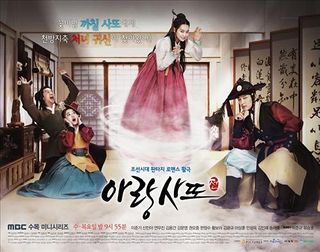Phoenix most often refers to:
Champ is the short form of champion.
Mara or MARA may refer to:
A monster is a type of fictional creature found in horror, fantasy, science fiction, folklore, mythology and religion.
Moss is a small, soft, non-vascular plant that does not have flowers or seeds.

Rangda is the demon queen of the Leyaks in Bali, according to traditional Balinese mythology. Terrifying to behold, the child-eating Rangda leads an army of evil witches against the leader of the forces of good — Barong. The battle between Barong and Rangda is featured in a Barong dance which represents the eternal battle between good and evil.
Kara or KARA may refer to:

Stories and practices that are considered part of Korean folklore go back several thousand years. These tales derive from a variety of origins, including Shamanism, Confucianism, Buddhism, and more recently Christianity.
Korean horror films have been around since the early years of Korean cinema, however, it was not until the late 1990s that the genre began to experience a renewal. Many of the Korean horror films tend to focus on the suffering and the anguish of characters rather than focus on the explicit "blood and guts" aspect of horror. Korean horror features many of the same motifs, themes, and imagery as Japanese horror.

Batu Arang is a town in Gombak District, Selangor, Malaysia, that is located about 50 km (31 mi) from the capital Kuala Lumpur. Coal was first discovered in the region in 1908, when British authorities found large deposits of coal reserves that could be commercially viable and fuel a railway system. The town was established when the British started mining operations. In 1915, a railway system linking Batu Arang and Kuang was built to transport coal to the rest of the country. As coal output and demand increased, rail services to and from Kuala Lumpur expanded. The demand for coal from Batu Arang skyrocketed due to the First World War, which led to a reduction of coal imports. The local coal was frequently sold to the railway companies, power stations, tin mines, dredges, and end customers.
Arang (Korean: 아랑) is a figure in the folklore of the Miryang area of Korea. According to the legend, she was the daughter of a magistrate (busa) of Miryang during the Joseon Dynasty. Her wicked nanny conspired to have the servant Baekga seize her at night and rape her; however, she resisted and Baekga stabbed her to death. Her father, thinking she had eloped with a stranger, resigned his position in shame. Thereafter, whenever a new magistrate was appointed Arang's spirit would appear before him to seek his help in getting justice and eventually no one wanted to take the position out of fear. At last a bold man named Yi Sang-sa was appointed to the post, and he promised Arang's spirit that he would avenge her. He had Baekga arrested and executed. Thereafter, her spirit ceased to trouble the town.

Arang is a 2006 South Korean horror thriller film directed and co-written by Ahn Sang-hoon. It stars Song Yoon-ah and Lee Dong-wook as two detectives. The film was inspired by the folklore of the same name, which tells of a vengeful spirit of a woman who was raped and killed, murdering magistrates in a village.

Young-ha Kim is a modern South Korean writer.

Arang and the Magistrate is a 2012 South Korean historical television drama (sageuk), starring Lee Joon-gi, Shin Min-a, and Yeon Woo-jin. The period horror-romance is based on the folklore of Arang, who died unjustly and returns as a ghost in order to reveal the circumstances surrounding her death. It aired on MBC from August 15 to October 18, 2012 for 20 episodes.
Mu-young is a Korean unisex given name. The meaning differs based on the hanja used to write each syllable of the name. There are 21 hanja with the reading "mu" and 32 hanja with the reading "young" on the South Korean government's official list of hanja which may be used in given names.
The word 火車 literally means "fire cart", "fire chariot", or "fire vehicle" in Chinese, Korean and Japanese, and may refer to:
Bulgasari is a lost 1962 South Korean film by Kim Myeong-je.
This page is based on this
Wikipedia article Text is available under the
CC BY-SA 4.0 license; additional terms may apply.
Images, videos and audio are available under their respective licenses.





